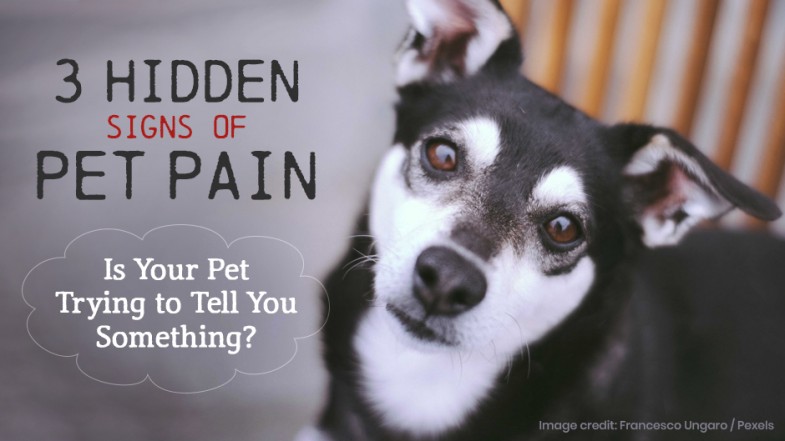Magnolia Veterinary Hospital News
3 Hidden Signs of Pet Pain - Is Your Pet Trying to Tell You Something?

Pain and your pet: two things you never want to think about together. When our pets hurt, our hearts break. We do everything we can to help our beloved companions avoid the irritation and anguish of physical discomfort. Yet it can be challenging to recognize how your pet experiences pain and exhibits distress. It would be so much easier if our furry family members spoke human!
What is pet pain like? Our dogs, cats, and other domestic animals are prone to the same types of pain we experience, like surgical pain, arthritis, or trauma-related pain, to name a few. Sharp or acute pain is often from an injury and is typically accompanied by limping or vocalizing. Long-term aches and soreness caused by internal discomfort may be harder to spot as your pet instinctually hides their compromised health.
If you’ve wondered if your pet’s behavior changes are more than “just signs of aging,” we can help. To bring attention to Pain Awareness Month this September, we’ve put together the common signs of pet pain to help you spot if your pet is stoically suffering. Keep reading to see if it’s time to bring your furry friend in for an evaluation.
1. Your Pet Doesn’t Eat as Well They Used To
Chronic and acute pain can wreak havoc on your pet’s appetite or ability to eat a nutritious meal. If your pet no longer looks forward to their dinner after a lifetime of being a chowhound, it could be because of pain.
A common reason for a decreased appetite in pets is an infection or underlying diseases, like diabetes, cancer, or hyperthyroidism. Stomach or intestinal blockages are often seen in curious pets who get into the garbage or big dogs who chew small toys. Dental issues and mouth pain can also make a pet hesitant to eat.
Have you noticed any of these changes in your pet’s eating habits?
- Less enthusiasm for a meal
- Not finishing their regular portion
- Avoiding harder food or treats
- Chewing less
- Vomiting after they eat
2. Not Partaking in Activities Your Pet Once Loved
Have you seen your pet stop joining or enjoying the activities they once loved? Maybe your birdwatching cat hesitates to jump up on the windowsill, or your social dog won’t play with friends. Often these changes are gradual and can be attributed to aging. But they could also be a sign your dog or cat is experiencing chronic pain, typically from culprits like arthritis and inflamed joints.
Have you seen a change in your pet’s interest in these activities?
- Walks
- Playtime
- Being pet
- Grooming
3. Your Pet’s Personality Isn’t the Same
You’ve likely seen a senior dog react to a puppy by showing their teeth or snapping to tell the young upstart to get lost. Even if your pet isn’t aggressive by nature, they may often exhibit a change in personality when they’re in pain.
The ache and stress of pain can cause your pet to become more withdrawn, defensive, or aggressive. These are natural instincts to protect themselves and a side effect of not feeling well.
What changes in personality should you look out for?
- Change in sleeping pattern
- Restlessness
- Increased neediness
- Avoiding other pets
- Avoiding people
- Being snippy
Provide Your Pet with a Pain-Free Life
Did you recognize any of these signs of pain in your pet? Concerned about how aging will affect your senior cat or dog? If you notice any of these symptoms or other changes that have you worried, make an appointment for an examination today.
Along with paying close attention to your animal companion’s habits, keeping an annual exam on your calendar is the essential commitment you can make to their health. Regular checkups help us diagnose developing conditions and prevent problems before they get worse. We can provide you with guidance to help your pet age gracefully and answer questions you may have about what’s normal and what’s a cause for concern.
There are many options for treating your pet’s pain, including medications, physical rehabilitation, acupuncture, laser therapy, and therapeutic massage. Schedule an appointment today and we’ll help you find the right fit for your companion, lifestyle, and budget. You and your pet will rest easier when they find relief from pain.
Categories
Recent Posts

If your dog won’t stop licking, chewing, or scratching one spot, it’s natural to wonder: “Is something wrong with my pet?” While occasional itching can be common, constant attention to a single area can signal a more serious issue, such as a hot spot. These inflamed patches of skin can appear almost overnight and quickly become painful and infected without treatment.
Let’s explore what hot spots are, what causes them, and how to help your dog heal quickly.

Sunshine, open windows, and the promise of new adventures—summer road trips are hard to resist. And if you’re like many pet parents, there’s no way you're leaving your four-legged friend behind. Whether you're headed to a cabin up north, the lake for the weekend, or on a cross-country tour, traveling with pets takes some extra planning. But with a little prep, your journey can be just as smooth for them as it is for you.
Before you gas up the car and grab the treats, here’s what you need to know to help your pet stay healthy, safe, and comfortable on the road.

Think heartworm is just a summertime issue? Or that your indoor cat is safe from it? You're not alone—many pet owners have heard (and believed) myths about heartworm disease. But the truth is, this serious and potentially deadly condition affects pets in every state and can impact even those who never leave the house.
Let’s clear up the confusion and give you the real facts about heartworm—so you can protect your furry family members with confidence.